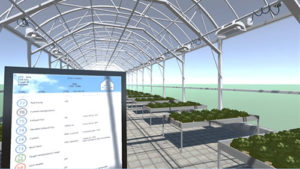Students involved in Mississippi State University‘s (MSU) Future Growers Technology Initiative will be using 3-D virtual reality technology to navigate and increase their understanding of the high-risk aspects of the agriculture industry.
Today’s farmers, from family farms to large-scale agricultural concerns, are integrating state-of-the art technologies into their operations to increase crop yields and efficiently use water, fertilizer, and pesticides, decreasing negative environmental impacts and increasing worker safety. One aspect of this, controlled-environment agriculture (CEA), is a technology-based approach toward food production. CEA assists in providing protection and maintaining improved growing conditions for crops throughout their development within an enclosed growing structure, such as a greenhouse, optimizing the use of resources such as water, energy, space, capital, and labor.
Some of the goals of MSU’s Future Growers Technology Initiative are to “design next-generation cyber learning approaches [web and program application program interfaces (API)] through high-risk, high-reward agricultural computing systems and to increase the capacity of agricultural educators to advance student knowledge of production under CEA systems.”
One project, the development of a simulated virtual reality greenhouse funded by a three-year USDA National Institute of Food and Agriculture grant, is nearing completion.
The project is a partnership of MSU’s Department of Plant and Soil Sciences in the College of Agriculture and Life Sciences and the Center for Advanced Vehicular Systems (CAVS). The prototype is now being refined by Pulseworks, LLC, a developer of motion simulators.
“We expect to beta-test the first iteration of the Future Growers Greenhouse in the classroom this fall. After testing and tweaking, we are hopeful the product can get to any market by 2022-23,” said Amelia Fox, clinical professor in Plant and Soil Sciences at MSU.
Richard Harkess, a professor of Plant and Soil Sciences at MSU, plans to use the technology in his greenhouse crops production course this coming fall 2021 semester.
Modern greenhouses contain a multitude of systems for environment control, irrigation, feeding, pest control, and more. Students may have the opportunity to see these systems but do not often have access to experiment with settings and observe outcomes. Once MSU’s 3-D simulation greenhouse is online and available for students to use, it will not only give future farmers a safer state-of-the-art tool, but will also redefine the time it takes to analyze crop production. With this innovative system, students will be able to complete the full cycle of crop planting, growth and harvest within hours compared to the months it takes in the real world.
Within the virtual greenhouse, which allows for individual study, students will grow spinach, lettuce, and tomatoes from seed to market. The MSU team also will test the efficacy of the system by measuring how much the students learn from it.
“Initially, individual students will be tested in the beta-VR environment and monitored for response, learning and retention,” Fox explained. “Ultimately, most students will be using the training device in a self-directed manner by following a step-by-step guide inside the virtual environment. VR allows teaching at a level not usually possible in a conventional classroom. At the same time of the VR test, some students will receive conventional greenhouse instruction while another population will get both VR and conventional (hands-on) training. The results should be fascinating.”
Fox said that unlike any conventional greenhouse on campus, this controlled condition system in 3-D will give students complete access to take charge of the environmental controls.
“With virtual reality, we can tackle teaching high-risk agricultural enterprise, defined as anything that could result in significant loss—from loss of life or limb to loss of production, equipment or supplies. From how to control a greenhouse or poultry house to how to operate a tractor, virtual reality can help students learn to navigate high risk situations safely,” she said in a press release.
Noting the anticipated benefits of the project to students, Fox said, “Owing to the limitations most universities have in teaching greenhouse controls, we are hopeful that a new generation of techno-savvy horticulture workers will arise from the project.” The knowledge and skills gained are not limited to crop production. “Please know that other agricultural industries use environmental controls as well (poultry, grains, hogs, etc.),” she added.
Anticipating a successful launch, Fox said there are plans to expand this technology training platform to the other agriculture industries mentioned above, as well as flight (unmanned and manned).
Collaborators on the project include Christopher Hudson, a CAVS research engineer implementing the temperature and plant growth models for the virtual greenhouse, and Shuchisnigdha Deb of the University of Texas at Arlington, who is working with MSU investigators to assess the design and application of the virtual greenhouse in the classroom. In addition to Pulseworks, industry partners include Wadsworth Control Systems, which develops greenhouse automation systems, including climate controls, curtain systems and vent automation; and Chore-Time, a division of Chore Time Brock, a leading global designer, manufacturer and marketer of agricultural systems and solutions.
- How we connect incoming students to the university resources they need - July 4, 2025
- AI and the workforce: Reskill to meet the moment - July 1, 2025
- Beyond the game: Why business expertise is the future of sports management - June 26, 2025
